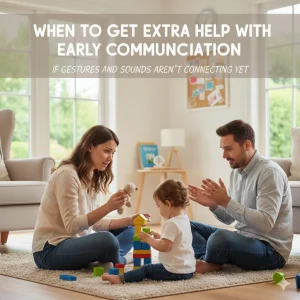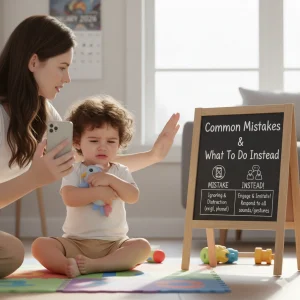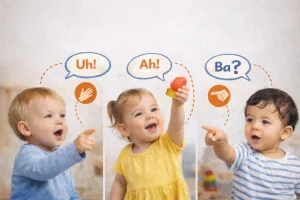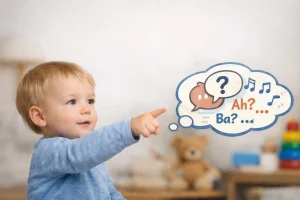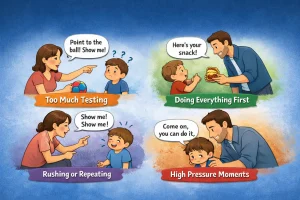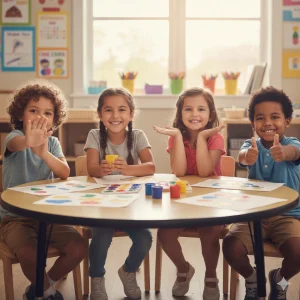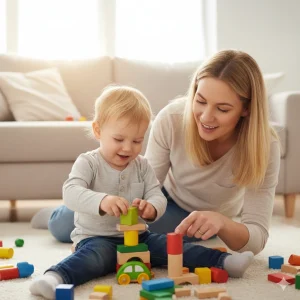10 Signs Your Toddler Might Need Speech Therapy
By Rajini D
Last Updated: June 24, 2025
Is your toddler not talking much yet? Some children speak early, while others take more time — and that’s okay. But if you’re wondering, how to know if my toddler needs speech therapy, there are signs to look for. Speech delays can show up in small ways, like not using simple words or struggling to express needs. Acting early can make a big difference in your child’s communication skills. This article will walk you through 10 clear signs to watch for — and when to seek help.
Free Speech Help for Kids
Concerned about speech delays? Book a free consultation with our expert speech therapist and get guidance tailored to your child’s needs.
What is Speech Delay in Toddlers?
A speech delay means your toddler isn’t meeting the typical milestones for talking or using words. While every child grows at their own pace, if your child isn’t babbling, saying words, or trying to communicate like other kids their age, it could be a sign of a toddler speech delay.
In simple terms, it’s when your child isn’t using sounds, words, or gestures as expected.
There are two key types of language delays:
| Type of Language | What It Means | Example |
|---|---|---|
| Expressive language | How your child talks and expresses thoughts | Struggling to say words like “mama” or “water” |
| Receptive language | How your child understands what others say | Not following simple directions like “Give me the toy” |
Some children may have delays in both. These are often grouped as language delays in toddlers or communication delays.
10 Clear Signs Your Toddler May Need Speech Therapy
1. Your Toddler Isn’t Saying Any Words by 15–18 Months
If your toddler isn’t using any real words like “mama,” “dada,” “ball,” or “milk” by 15 to 18 months, it may signal a speech delay. Even a few consistent, meaningful words by this age are important.
Example: If your 17-month-old only babbles or makes sounds but hasn’t said a single clear word yet, it’s worth checking in.
2. Limited Use of Gestures Like Pointing or Waving
Toddlers usually point to objects they want or wave goodbye by their first birthday. If your child avoids gestures or doesn’t use them to communicate, it may be a communication red flag.
Example: If your toddler wants a toy but just cries or stands silently instead of pointing to it, this could be a sign.
3. Not Responding to Their Name or Simple Instructions
Your toddler should respond when you call their name and understand basic directions. If they don’t, it might suggest a receptive language delay — meaning they’re not processing language properly.
Example: If you say “Come here” or “Give me the ball” and your child ignores you or looks confused, take note.
4. Only Repeating Words Instead of Using Their Own Sentences
Some toddlers echo what you say instead of creating their own phrases — a behavior known as echolalia. This can be linked to speech or developmental delays.
Example: If you ask “Do you want water?” and your child simply repeats “want water” instead of saying “yes” or pointing to the glass, that’s echolalia.
5. Difficulty Putting Two Words Together by Age 2
By two years old, most toddlers start combining two words — like “want juice” or “go park.” If your child still uses only single words, it may suggest a language delay.
Example: A 26-month-old who says “car” or “ball” but never says “big car” or “roll ball” could benefit from early speech support.
6. Speech That’s Hard to Understand Even for Family
If even close family members can’t understand what your toddler says most of the time, there may be clarity issues with their speech sounds.
Example: Your child says “gog” for “dog” or “muh” for “milk” consistently, and only you can decode it — others are confused.
7. Frustration or Tantrums When Trying to Communicate
When children know what they want but can’t say it, they often get upset. Frequent meltdowns while trying to talk may point to a communication challenge.
Example: Your child throws a tantrum at snack time because they can’t say “banana” or express hunger — even though they’re clearly trying.
8. Regression in Speech or Suddenly Stops Talking
If your child was speaking and suddenly stops using words they once knew, this regression is a red flag. It could be linked to developmental concerns like autism.
Example: A child who used to say “mama” and “car” regularly, but now is mostly silent or babbles, should be seen by a specialist.
9. Prefers Gesturing or Pulling Over Using Words
Some toddlers rely on pulling your hand or pointing instead of speaking, even for simple things. This could signal a delay in language development.
Example: Instead of saying “open” or “more,” your toddler pulls your hand to the cupboard or grunts repeatedly.
10. Your Gut Feeling Tells You Something is Off
You know your child better than anyone. If something doesn’t feel right — even if you can’t pinpoint it — trust your instincts and talk to a professional.
Example: You notice your child isn’t trying to talk like other toddlers, but friends tell you to “wait it out.” If it doesn’t sit right with you, act now.
When Should You Worry About Your Toddler’s Speech Delay?
It’s natural to wonder whether your toddler is “just a late talker” or if something more is going on. So, when should you seek speech therapy? One helpful way to decide is by checking how your child’s speech and language skills line up with typical milestones.
Here’s a quick guide to age-based communication milestones:
| Age | What Most Toddlers Can Do |
|---|---|
| 12 months | Babble using different sounds (“ba-ba,” “da-da”), respond to their name, use gestures like pointing or waving |
| 18 months | Say at least 6–10 clear words, imitate simple words, understand common words like “cup” or “shoe” |
| 24 months | Say 50+ words, use 2-word phrases like “want juice,” follow simple instructions (“give ball”) |
| 36 months | Speak in 3-4 word sentences, be understood by parents most of the time, ask simple questions |
Key signs to act early:
- Your child isn’t saying any words by 15–18 months
- You notice a sudden loss of speech skills
- You feel like they’re not catching up, even with time
- Your gut tells you something isn’t quite right
Why Early Speech Intervention Really Matters
You’ve probably heard the phrase, “They’ll talk when they’re ready.” While it’s true that children develop at different speeds, waiting too long can sometimes delay the help your child truly needs. You can also try these speech therapy activities at home to support early development alongside professional help.”
The Benefits of Early Intervention
Getting support early doesn’t just help your child talk sooner — it sets the stage for lifelong learning, confidence, and social growth. Here’s how:
| Benefit | Why It Matters |
|---|---|
| Stronger brain development | Toddlers’ brains are most flexible in the early years, making it easier to build language pathways. |
| Faster speech progress | Children often improve more quickly with early speech therapy than if they start later. |
| Better social skills | Talking helps kids make friends, express feelings, and avoid frustration. |
| Smoother school readiness | Early support means fewer struggles when it’s time to start preschool or kindergarten. |
| Less emotional stress | Children (and parents) feel more confident when communication becomes easier. |
Why Waiting Might Not Help
If your toddler is showing signs of a delay, hoping they’ll “catch up” on their own can sometimes mean missing a valuable window for progress. The earlier you act, the more your child benefits — not just in speech, but in thinking, playing, and bonding with others.
Conclusion
If you’re wondering how to know if my toddler needs speech therapy, trust your gut — it’s okay to ask for help early. Getting support at the right time can make talking easier and more fun for your child. You don’t need to wait for things to get worse. At Wellness Hub, we offer free expert consultations to guide you, whether your child needs therapy or just a little support at home.
Frequently Asked Questions:
1. How do I know if my toddler needs speech therapy?
You may notice your child isn’t talking as much as others their age. If they don’t say basic words by 15–18 months, don’t respond to their name, or only repeat what you say (without using their own words), these are signs of a speech delay. If you’re unsure, it’s always okay to ask. A speech therapist can help you understand what’s typical and what may need extra support.
2. What is a normal age for a toddler to start talking?
Most children say their first words like “mama” or “dada” around 12 months. By 18 months, they usually have 6–10 clear words. By 2 years, toddlers should be combining words like “want toy” or “go outside.” If your child isn’t meeting these milestones, it might be time to talk to a professional. Early speech therapy can help them catch up.
3. What are signs of speech delay in toddlers?
Some common signs include:
- Not saying any words by 15–18 months
- Not pointing, waving, or using gestures
- Not responding to their name
- Only repeating words (echolalia) instead of speaking freely
- Getting upset when trying to talk
These are early red flags for language delay, and they’re worth checking with a speech expert.
4. Can a 2-year-old have a speech delay?
Yes, and it’s actually a common age when delays become more noticeable. By age 2, most toddlers say 50 or more words and start putting two words together. If your 2-year-old isn’t doing this, or seems hard to understand, they might benefit from speech therapy. The earlier you start, the easier it is for them to improve.
5. What causes speech delay in toddlers?
There are many possible reasons:
- Hearing problems
- Developmental delays
- Autism spectrum disorder
- Neurological or brain differences
- Not enough talking or interaction at home
Sometimes the cause isn’t clear — and that’s okay. A speech therapist can help identify what’s happening and guide you with the right next steps.
6. Does speech delay mean my child has autism?
Not always. Many children with speech delay do not have autism. But if speech delay is combined with things like not making eye contact, avoiding social play, or repeating phrases over and over, it could be a sign of something more. A developmental specialist or therapist can help you figure it out.
7. Can toddlers catch up on their own without therapy?
Some children might catch up on their own, but others need support. It’s hard to predict who will catch up and who won’t. That’s why it’s better to get help early. Speech therapy can make a big difference and prevent frustration for both your child and you. Early support builds strong language skills for the future.
8. What happens during speech therapy for toddlers?
Speech therapy is play-based and fun! A speech therapist (SLP) uses toys, games, pictures, songs, and books to teach your child new words, sounds, and ways to communicate. They also help with understanding simple instructions and improving speech clarity. Parents are often included so you can keep practicing at home.
9. Is it too early to start speech therapy at age 2?
Not at all. In fact, speech therapy works best when started early, usually before age 3. Early intervention takes advantage of how quickly your child’s brain is developing. Children who start early often make faster progress and may need fewer sessions in the long run.
10. Where can I get help for my toddler’s speech delay?
You can start with a free consultation from a speech therapist. At Wellness Hub, we offer both online and offline speech therapy programs for toddlers. Our experts are kind, experienced, and work closely with parents. You’ll get clear guidance, fun home tips, and a plan that fits your child’s needs.
About the Author:
Rajini Darugupally
M.Sc., Speech-Language Pathologist (9+ years of experience)
Rajini is a passionate and dedicated Speech-Language Pathologist with over 9+ years of experience, specializing in both developmental speech and language disorders in children and rehabilitation in adults. Driven by a desire to empower each individual to find their voice, Rajini brings a wealth of experience and a warm, genuine approach to therapy. Currently, at Wellness Hub, she thrives in a team environment that values innovation, compassion, and achieving results for their clients.
Book your Free Consultation Today
Parent/Caregiver Info:
Client’s Details:
* Error Message
